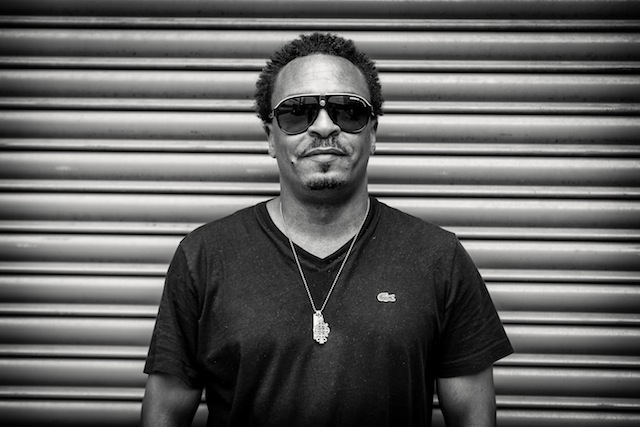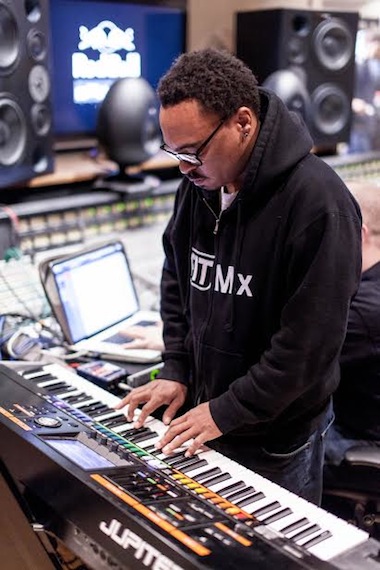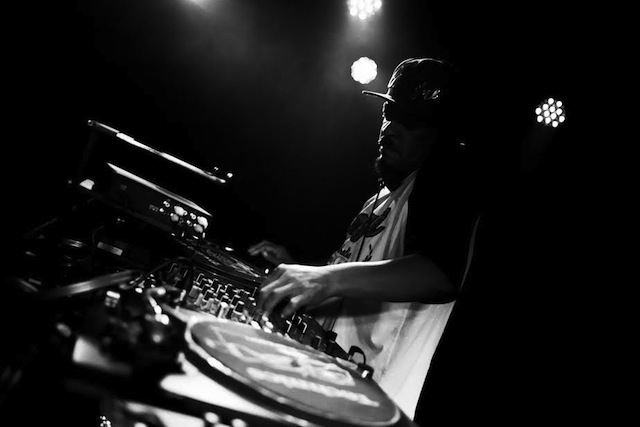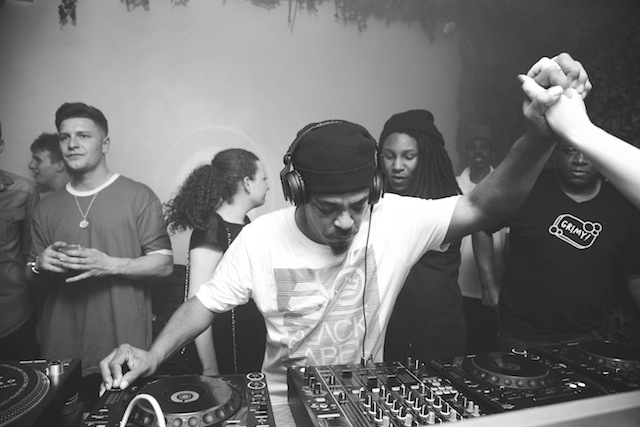Keeping The Beat Alive: An Interview With House Legend Roy Davis Jr
By Kevin Robinson in Arts & Entertainment on Jul 29, 2014 7:00PM

Roy Davis Jr
A legendary producer and DJ in the UK and Europe, Roy Davis Jr. still remains more of a cult figure in the city in which he grew up. Known for producing soulful anthems and DJing sensuous and very danceable House sets, Davis is synonymous with Chicago abroad and House music in the U.S. Davis grew up in a family steeped in musical traditions. “My mom played keys, my uncle played keys for Roberta Flack, my mom ran the church choir for many years,” he said.
Introduced to dance music by Farley Jackmaster Funk and Little Louis, electronic music quickly because an important force in the young Davis’s life. “Once the whole drum machines, the Roland 303 machines started to appear around the neighborhood, I just started spending a lot of time on my keyboard.” Davis started DJing House music, but meeting some other local musicians would be a key to his future success. “I met DJ Pierre, he was a local DJ in a town called University Park, another area I grew up in in the South Suburbs. When I met him he was always spinning in the garage, and he found out that I was a DJ.” This led to a long-lasting friendship between the two that would help Davis make some of his first, early breaks as a producer. “I got to write some of the first earlier Jack Trax records he did, and it was called 20 Below, with JR Jordan. I was about 16, I didn’t really know much, just putting my feet in wherever I could get it in, have some fun with it. “
No description of Roy Davis Jr would be complete without mentioning his 1998 hit “Gabriel,” featuring Peven Everett. Hailed by some as the song that kicked off the UK Garage scene, it’s one of his most iconic tracks. Earlier this year Davis released his latest album, Destroy and Rebuild, a serious nod to the Chicago sound. "The soulless dance music that most people have access to is so commercialized and sugar coated. It's time to take this black music from the hoods of Chicago, Detroit, LA, back over the top," says Davis.
Well-regarded artistically abroad, here in Chicago Davis is known not only for his work with Acid House pioneers Phuture but also DJ sets that span genres, from soul, R&B and disco to House, hip-hop and rock. What follows is an edited transcript of our conversation with Roy Davis Jr about Chicago, electronica and the past, present and future of House music.
Roy Davis. Jr performs at Smartbar on Sunday, Aug. 3. And don't forget to listen to and download the exclusive mix Davis made for Chicagoist at the end of this interview!
Chicagoist: How did House music first come into your life?
Roy Davis Jr: I started out as a breakdancer, mixing stuff like IRT Watch the Closing Doors, and I was spinning for the breakers. There came a point where the music started changing, the radio started picking up and mixing stuff like Planet Rock from Soul Sonic Force with Italian Disco. So that was kind of like the point for me, crossing over from the B Boy over to the House. I started hearing Farley Jack Master Funk on the radio, staying up for hours and hours, with cassette tapes, trying to record mixes from the Hot Mix Five, those guys. I was like “man, this is some good music.”
RDJ: Yeah, it’s kinda crazy. Sometimes I can’t even eat at a restaurant, and people recognize me, from magazines, from the radio, from posters. Here it’s a big difference, I mean, it’s an industry, I’m known, of course the House followers, but it hasn’t become mainstream in America for me, even though I’ve worked with all the mainstream artists, [like Disclosure], it’s a little different. It’s good to come home to some peace. You know, some of my friends get mad because I don’t go out as much. I mean, I go out, but it depends on if I’m not exhausted. Everyone wants me to come out, but they don’t put all the thought into it - if I just got off of two flights, three countries. And I’m like, “Ah! I’m home!” But it’s cool, I actually spend my time between here and Los Angeles. I don’t actually spend all that much time here, but when I”m here all the guys come over, maybe I’ll take a date, go play at my friends.
C: So you still live in Chicago, at least part time?

Roy Davis Jr at RB Studios
C: Can I ask where? Just in general terms, what part of the city do you live in?
RDJ: I’m in Country Club Hills right now. I used to live in Logan Square.
C: Why’d you leave the city?
RDJ: Peace of mind, children, everything. When I was in the city, everybody was pulling on me. I felt like, sometimes you gotta get away, to focus in life and continue to do what you do. When I first left, I was married, I’m divorced now, moved to Naperville, my kids are still there, go to school there. And I’m just trying to keep on moving.
C: I think that’s the reason lots of people leave the city, because of their kids.
RDJ: I wanted to have a backyard, and have them do certain things. It’s cool, I mean, I still take ‘em out to the lake and do special trips, you know, kick it.
C: When you first got started, listening to the Hot Mix Five on the radio, Italian disco, at what point did House music stop being something that you and your friends were doing in garages and basements, and started becoming a musical movement, something that was bigger than you and your friends?
RDJ: I don’t know, I just feel like I was blessed. My first studio sessions were at this company called Trax records in Orland Park. That was part of Jack Trax from England came in, and they put a lot of people in the studio. So my first couple of major studio sessions were my first couple of songs. Some people come in for studio time and work all hard every day for that time, but I kind of got the grasp for it at an early age. I did not know that this was going to be my career.
C: So you just got the studio time because you were hanging around other people that had access to that sort of stuff.
RDJ: Those guys were ahead of me, like the first generation, and it was just like being at the right place at the right time, and having people believe in you. And I decided to go ahead and take the lead and go to New York and work.
C: Do you feel like there was ever a time in Chicago, where you were playing out a lot, where you were a popular DJ in Chicago, or have you always felt like you’ve had to be outside of the city to get your due?
RDJ: My first big party was playing at the Bismarck Hotel, and that was a Chicago Bad Boys party, with Steve Poindexter, and I think Terry Hunter, maybe Ferris Thomas, but we had a whole crew, that was maybe 100 people deep, guys hustlin’ together, workin’ together, production together. We used to run around with the same jackets on, Chicago Bad Boys. That was my first gig to let everyone know that I was serious. What I don’t do, is I don’t over play, I keep myself at a certain distance, so that people have time to miss me, to think about me. You can get into that whole circuit of playing in Chicago, you could play every week in Chicago, you know, and you’re not that exciting. So I would go abroad and play around the states, in Europe, and I would play once a month, maybe twice a month in Chicago.
C: What was the scene like at the Bismarck Hotel, when you were first spinning as a DJ?
RDJ: I used to go to the Bismarck before I spun there, and Little Louis used to throw parties there, in the Diamond Court. Back home [in Chicago] I wasn’t on that stage yet. I was just a part of just going there, dancing, going crazy, acting wild. It was a mixture crowd, it was black, Hispanic, it was a mixture crowd at Louis’s parties. And people dressed a little different. People dressed a little bit more classy. Patent leather shoes, Gucci belt buckles, you know, nice casual shoes and pants you could maneuver and dance in. It was years later by the time I got the chance to play there.
C: It seems like House music transcends race and class a little bit, especially in Chicago.
RDJ: I think the music always had like this positive energy around it. It just draws people to it to make them feel free. It was not [narrow minded] where sometimes there were certain hip-hop categories that can fall into it. House is a little different. It was like everybody was accepted.
C: Do you think that House music fits into the larger pantheon of Black music in America?
RDJ: The truth of the matter is, like, House started in Chicago, but it became a business in Europe. So by them taking it under their wings, and putting the money behind it to make it popular, it wasn’t pushed here on the radio, as far as single records, maybe in the mixes, but a lot of the single records weren’t promoted like they are in Europe. Like I got songs in regular rotation there, I’m on BBC Radio One right after [this interview]. It’s a big difference. I don’t know if it’s the fact that Clear Channel controls a lot, and maybe they need to get someone who can hit the streets a little bit more, to know exactly what the people want these days. A lot of good music and a lot of House music is being held back. The only acts you hear of these days are the ones that make it to the major labels.

Roy Davis Jr photo by Sean Delahay
C: Chicago House, in particular, I can hear the difference between Black House music and Latin House music.
RDJ: I feel like there are so many different styles of House music, even back then. What we were calling House music, like tracks, like “work them motherfuckers” by Steve Poindexter. Those were like tracks to us, and then all of a sudden it got changed to people calling it techno. You know? But to us that was the Chicago sound, it was tracks. It was like “did you hear that track?” Then you had the vocal side of it, like with Marshall Jefferson. So there was the track side and the vocal side, and even on the Latin side, there was Liz Perez doing her thing, even Ralphie Rosario. But everybody could all come together and still have a good party. The sounds didn’t get to a point that, you know, no one could take it from each other. It was just about understanding groove, or melody.
C: It seems like your music draws pretty heavily on R&B, on a vocal soulful sound.
C: I’ve noticed that notions of God, of traditional Christianity sometimes make an appearance in your DJ mixes.
RDJ: That’s my way of letting the world know, of letting people know, that it doesn’t matter [if other people try to copy our sound or our style] in God we trust, we going to keep on going, no matter what. God gives us that strength to be eternal in our music.
C: You mentioned that your mom was in the church choir.
RDJ: I think that was a heavy influence, also. You know, when you’re creating, you want to play something for your mother. [Laughs.] And believe me, we were making some crazy tracks, like, “what is that boy making down there?” That was my way of showing that, yeah, you raised a good guy, and that I am a reflection of myself, and to reflect who I am, that’s what I’m sharing with the world. You know, to stay positive. America’s been going through a lot, especially in Chicago we’ve been having lots of problems with killings, and you know, a lot of things going on, whoever might encounter my music, whether I’m here or I’m gone, one of those songs might be the thing to uplift them for the day.
C: I noticed you like to mix in speeches from the Civil Rights movement, as well.
RDJ: You can’t forget Martin Luther King, people like that. That’s been a part of House music before me. People been doing that on the radio for many years. That’s just a style and reflection to uplift people.
C: You’ve talked a lot about the House scene going back to the Bismarck. And there’s this sense that the music is supposed to transcend everything, that love and inclusion is at the center of it. At the same time, it’s pretty heavily identified with the underground. It seems that those two notions might be opposed to each other.
RDJ: There’s always got to be light somewhere. If you go into the darkest places, it’s your duty to reflect that. I never looked at the differences between that whole underground/commercial thing, because I am a producer. So I’ve done a lot of different things in the commercial [realm]. As a writer and a producer, I have to be me. As a DJ, I don’t know, sometimes you can hear me and you might think, that sounds a little commercial, that’s not underground. How can you define it, if it’s all music and I’m trying to transcend different ideologies, playing what I like, what I think people like, or make them dance.

Roy Davis Jr
C: When you DJ, when you look out and you see people in the crowd, do you tailor your set to the crowd?
RDJ: I don’t play too selfishly, where I feel like ‘oh, this is all about me.’ People are here to dance, to enjoy. If I see a non-reaction, I’ll try to pick it up with something else on the next record. it’s all about reading the crowd. Some guys are very programmed, they know exactly what they’re going to play, and they'll play that set every time. That’s not me.
C: How do you put together your sets?
RDJ: Honestly, I just pray before every set. Before I leave out the hotel room, I pray, ask God to bless me and allow me to deliver something good and have a good performance. I don’t preprogram, I never did. I might have my favorites, that I know I want to play, but in between that, it’s all raw. It’s nothing like programmed, like on Traktor, nothing like that.
C: Do you DJ with Traktor, or do you use CDs, or vinyl?
RDJ: I use a USB with a CDJ, it’s like having a computer, because you can put a 64 gig, or even a terabyte chip into the CDJ, and you have your folders. It’s the same thing as having a laptop, you have a folder, folders and folders of music. And it’s easy for me to travel with, and I have about five sticks with me, just in case one goes out, or something goes bad. You know, always be prepared. I don’t sync mix. That’s me personally, I feel like sometimes [the music] loses its edge, its momentum, the feel. It becomes very robotic. I’m not one of those guys that likes to use his laptop, hit lots of buttons. The raw art form is still in me.
It was very hard to adjust, when vinyl started fading out. I went through the phases of mixing reel to reel, mixing with a cassette deck with pitch, mixing with a CDJ, and then it got to the point where you’d go to a place where the turntables weren’t even kept up. It got to a point where, I couldn’t take vinyl with me anywhere. And now the vinyl is coming back. When I played [at Fabric in London] just this past weekend, every DJ had vinyl. You know I think everything goes in circles. It boils down to how comfortable you are, and as long you reflect that, what you’re trying to give, and that you can give it the way you want to.
C: Where do you get your music from? Do you still go record shopping?
RDJ: I get more records sent to me, than I have to go record shopping! So I play what’s given to me. When it comes to digital, I shop on Trackstore, Beatport, iTunes, wherever I can find music, I will go there. Sometimes I go to YouTube, and I think ‘oh this is a nice tune’ and I do a search for it. If I can’t find it, I’ll look for the guys on Soundcloud. If they post on Soundcloud, I’ll personally contact the artist myself and ask them to send it to me. All of my friends, they all make music - I’m a representative, especially of this city. Why not play a pal’s record? Why not play Derrick Carter, or Ron Trent, if they send you something. I like to be the first guy to play something.
C: You mentioned being a representative of Chicago, that’s something you feel when you’re abroad, when you’re in Europe?
RDJ: Most definitely. They love the Chicago sound, they love the different styles. You’ve got Glenn Underground doing one thing, and DJ Skull doing another thing. We have all these guys with different styles, but you know they’re all from Chicago. In my sets I try to be a reflection of that.
C: When you spin in Chicago, do you have favorite spots that you like to play?
RDJ: I feel like I’ve played them all! Maybe some of these festivals that they’re holding in our city. These guys have really brought the attention to Chicago. They should hire more people from Chicago. I mean, we are underground but some of us have crossed over. We should give these guys a chance, who’ve been doing this their whole entire lives, and to watch these guys come into their own city, and play big stages and big concerts, and not have the opportunity to show themselves. That’s something that I think Chicago needs to embrace, and these promoters that are hiring all these guys from everywhere else need to first love their city, love themselves, before you embrace others.
So for me, having been in the game as long as I have, I have yet to play a Chicago festival, but yet I’m playing festivals all over the world, with Lauryn Hill, Busta Rhymes, Disclosure. These are all people that are at the top. I look at it now, I look [these Chicago festivals], you know, you’ve got to get a couple of people, to reflect the region. You can’t hire everybody, but they need to do a better job. Everybody’s been working their whole entire life for this music, to spread the music. And those people on that stage will tell you, it all started in Chicago.
C: Do you listen to anything that’s not House?
RDJ: I listen to a lot of reggae, and started incorporating it into my electronic music. I like to listen to classical, jazz. I’m just all over the place, some rock records. Whether I’m just chilling by the fireplace, or banging it out in my house with my friends over. I like different styles of music. In order for me to be the best that I can be, you know, you need to listen to many different forms of music, to help you create something that may be different from the House that’s out there today.
Roy Davis Jr performs at Smartbar on Sunday, Aug. 3.